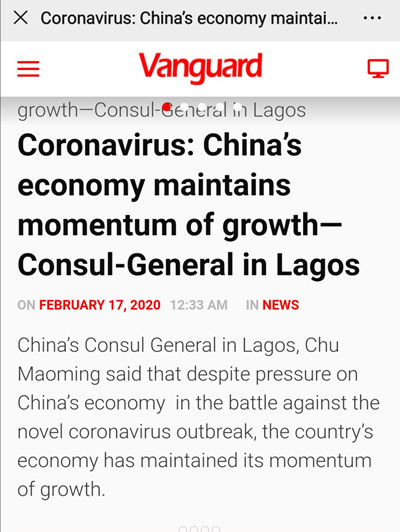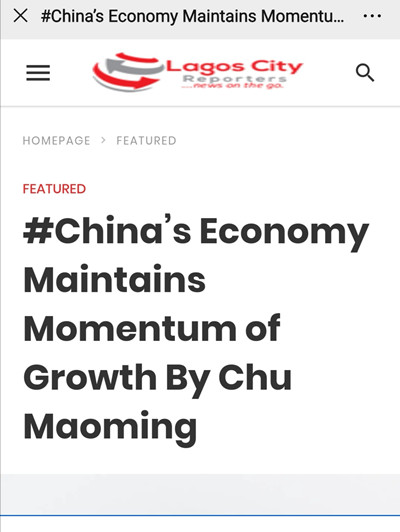China's Economy Maintains Momentum of Growth
by Chu Maoming
China's Consul General in Lagos
Recently, Nigerian media Lagos City Reporters, Vanguard and the Sun published an article written by Consul General Chu Maoming. The full text is as follows:


Recently, China's economy comes under pressure in the battle against the novel coronavirus outbreak. The epidemic and relevant quarantine measures are believed to have a negative impact on the economy to some extent. Factories suspended production and consumer spending was reduced amid the country's quarantine measures. Some people worry that the epidemic may drag down the economic growth in China and the world at large.
However, we should look at the impact of the epidemic on the economy from a comprehensive and reasonable perspective. In my opinion, the impact is short-lived and temporary. It will not change the momentum of steady and long-term economic growth in China.
I have full confidence in this, and here are main reasons for my confidence. First, China's economy is bigger. China's GDP was less than 14 trillion yuan (around 2.03 trillion U.S. dollars) in 2003 when SARS broke out. Now, it is nearly 100 trillion yuan (around 15 trillion U.S. dollars). The large increase creates more capacity for China to buffer external and internal shocks. Second, China's economy has a solid foundation. China is the world's largest trader in goods, biggest holder of foreign exchange reserves and second largest destination for foreign investment. China is the only country in the world that has all the industries under the industrial classifications issued by the United Nations. The sound fundamentals of the economy are unshakable amid the epidemic. Third, China's economy is more reasonable in structure. The economy used to be driven by manufacturing and exports. Now, although they produce a substantial portion of the country's GDP, the service economy and digital economy are playing more prominent roles, especially in hedging economic risks and uncertainty amid the epidemic. After the epidemic is brought under control, retail and consumption activities are expected to heat up and make up for the losses incurred during the quarantine period. Fourth, China is experienced, capable and confident in dealing with similar crisis. China won the battle against SARS in 2003 and dealt with the international financial crisis of 2008 successfully. China will be able to steer the economy back onto an upward trajectory and achieve sustained growth. The World Bank, the IMF and well-respected economists in the world have all agreed that the impact is temporary, and they have full confidence in China's future. China's economy is highly resilient and enjoys enormous potential for growth in the mid-to-long term.
While fighting the virus, China has spared no efforts to minimize the impact of the epidemic on the economy and strive to achieve this year's economic and social development goals and tasks. Supportive measures have been taken. The central bank has added a total of 1.7 trillion yuan into the banking system to boost liquidity and stabilize financial markets. The central government rolled out a favorable policy for small and micro-sized businesses, with supplies of power and raw materials, logistic services, and financial assistance put into place to help them resume production soon. A batch of companies has carefully resumed work, and more will do so in the coming days. Social and economic operations are awakening from their time off due to the epidemic. Confidence has been restored that the coronavirus outbreak will leave China's economy unscathed in the long-run.
As China's State Councilor and Foreign Minister Wang Yi pointed out in an exclusive interview with Reuters, China's market is big enough to withstand the impact of the epidemic, which is temporary. When the epidemic is over, the subdued consumer demand will be released rapidly, the dynamism of China's economy will rebound strongly, and the market will continue to grow.